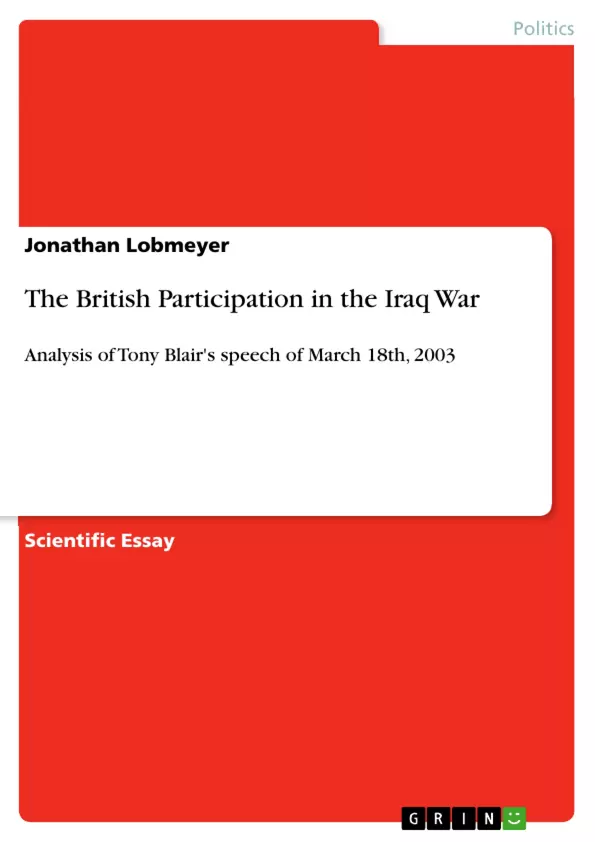The aim of this research paper is to analyse the language usage of politicians, in particular Tony Blair’s wording in regard to the third Gulf War. Hereby, the theories of identity and othering are used and combined with the theory of populism. The partnership between the USA and Great Britain is of course taken into account.
Inhaltsverzeichnis (Table of Contents)
- Introduction
- Research question
- Historical overview
- Impact of 9/11 on UK policies
- Role of the UK
- Theoretical approach
- Theory of populism
- Theory of identity
- Othering
- Discourse analysis
- Current State of research
- Methodical approach
- Operationalization
- Material selection
- Tony Blair's Rhetoric
- Analysis of Blair's speech from Tuesday 18th of March 2003
- Main statements of the speech
- Tony Blair's populist rhetoric
- Tony Blair's usage of othering
- Results
- Shortcomings
Zielsetzung und Themenschwerpunkte (Objectives and Key Themes)
This research paper aims to analyze the language used by politicians, particularly Tony Blair, in the context of the third Gulf War. It focuses on the theories of identity and othering, combined with the theory of populism, to understand how Tony Blair legitimized the British participation in the Iraq War. The analysis considers the partnership between the USA and Great Britain. Key themes and ideas in the text include:- The impact of the 9/11 attacks on UK policies and the subsequent "war on terror" agenda.
- The role of populism and identity construction in legitimizing political decisions.
- The influence of language and rhetoric on public opinion and political decision-making.
- The use of "othering" to justify political action and the consequences for international relations.
- The historical context and the complexities of the relationship between the USA and the UK in the lead-up to the Iraq War.
Zusammenfassung der Kapitel (Chapter Summaries)
- **Introduction:** This chapter introduces the historical context of the Iraq War and the controversial decision of the British House of Commons to participate in the invasion. It highlights the significance of Tony Blair's role in legitimizing the war and the importance of language and rhetoric in shaping public opinion and political discourse.
- **Research question:** This chapter defines the research question: How did Tony Blair legitimize the British participation in the Iraq War? It differentiates between legality and legitimacy and provides an overview of existing research on the topic, highlighting the controversial nature of Blair's actions and the perception of his legitimacy among the British public.
- **Historical overview:** This chapter outlines the impact of the 9/11 attacks on UK policies and the subsequent "war on terror" agenda. It details the role of the UK in the lead-up to the Iraq War, highlighting the difference in objectives between the US and the UK and the influence of the UN Security Council resolutions on the British government's decisions.
- **Theoretical approach:** This chapter explores various theoretical approaches, including the theory of populism, the theory of identity, and the concept of "othering." It explains how these theoretical frameworks can be applied to analyze Tony Blair's rhetoric and legitimization strategies.
- **Current State of research:** This chapter provides an overview of the existing research on the topic of Tony Blair's legitimization strategies and the British participation in the Iraq War.
- **Methodical approach:** This chapter outlines the methodological approach used in the research, including the operationalization of concepts and the selection of material for analysis.
- **Tony Blair's Rhetoric:** This chapter examines Tony Blair's rhetoric and its impact on public opinion and the legitimization of the Iraq War.
- **Analysis of Blair's speech from Tuesday 18th of March 2003:** This chapter analyzes a specific speech by Tony Blair, focusing on the main statements, his use of populist rhetoric, and his application of "othering" to legitimize the war.
- **Results:** This chapter presents the results of the analysis and discusses the findings.
- **Shortcomings:** This chapter acknowledges the limitations of the research and explores potential areas for further investigation.
Schlüsselwörter (Keywords)
This paper delves into the realm of political rhetoric and its influence on public opinion and international affairs. It explores themes of legitimacy, identity construction, and the use of "othering" as tools for legitimizing political action. The analysis focuses on the Iraq War, the role of Tony Blair, and the relationship between the USA and the UK. Key concepts include the impact of 9/11 on foreign policy, the theory of populism, and the application of discourse analysis to understand the complexities of political communication.Frequently Asked Questions
How did Tony Blair legitimize the UK's participation in the Iraq War?
Tony Blair used a combination of populist rhetoric, identity construction, and the concept of "othering" to build public and political support for the invasion.
What is the theory of "Othering" in political discourse?
Othering is a strategy used to characterize individuals or groups as fundamentally different or threatening, often used to justify military action or political exclusion.
How did the 9/11 attacks influence British foreign policy?
The attacks led to the "war on terror" agenda, which significantly shifted UK policies towards interventionism and strengthened the partnership with the USA.
What role did populist rhetoric play in Blair's speeches?
Blair employed populist language to simplify complex international issues into moral binaries, aiming to align the public's identity with the government's military objectives.
What is the significance of Blair's speech on March 18, 2003?
This speech was the final major effort to justify the invasion to the House of Commons, utilizing specific rhetorical tools to frame the war as a necessary moral and security imperative.
- Quote paper
- Jonathan Lobmeyer (Author), 2020, The British Participation in the Iraq War, Munich, GRIN Verlag, https://www.grin.com/document/1162295



